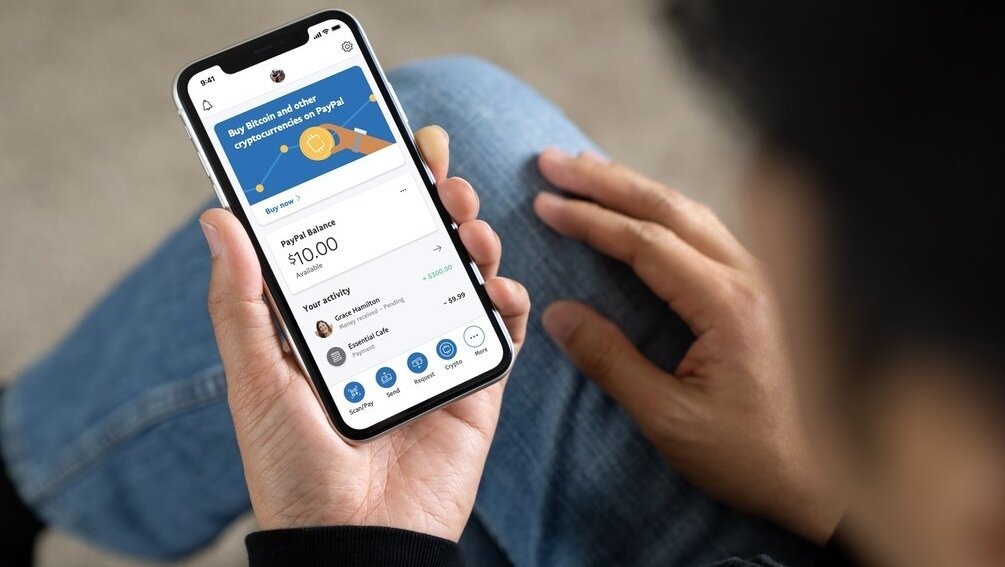- >Buying Crypto
- >How to Buy Bitcoin & Cryptocurrency with PayPal
How to Buy Bitcoin & Cryptocurrency with PayPal
PayPal Pros & Cons
Pros
PayPal is a user friendly option for most people to make online payments
PayPal is trusted as a secure platform for online payments
Many people already have a PayPal account
Cons
Buying cryptocurrency with PayPal has higher fees
There are strict limits on how much cryptocurrency users can buy via PayPal
Most exchanges don’t even offer PayPal as an option
Coinbase: Our Favorite Exchange That Accepts PayPal
Using debit cards and bank accounts connected to PayPal, Coinbase allows millions of US consumers with a quick and easy method to purchase crypto. We know that investing in cryptocurrencies should be straightforward and quick, but the reality is… it isn’t. There’s a lot to consider.
Bank transfers can take time and most people want a quicker method, with less hassle, to purchase cryptocurrencies. So, with just a few taps using PayPal on Coinbase, you can instantly fund bitcoin purchases.
So, how easy is it to buy crypto on PayPal using Coinbase?
• First choose the crypto you wish to buy, then tap on the payment option to “Add a payment method”
• Next, you’ll be shown a PayPal login screen and make sure your PayPal email address matches the Coinbase email address (if not, you will have to go over a two-factor authentication process).
• You can choose or add a debit card or bank account connected to your PayPal account after log-in — and that’s it!
With your PayPal account, you can make purchases up to $25,000 a day.
- Earn $200 in free crypto after completing sign-up process. Terms apply.
- Variety of products including exchange, staking, wallet
- Advanced Trading options for experienced traders
History of PayPal and Cryptocurrency
PayPal was launched back in 1998, and its original goals were somewhat aligned with Bitcoin’s goals. PayPal wanted to create a new form of internet money that would be frictionless and make sending payments to other PayPal users almost as easy as sending an email.
However, due to the centralized nature of PayPal, the company was never able to be as innovative and boundary-pushing as they hoped. That said, PayPal eventually became the de facto standard for online payments.
However, PayPal has not worked well with Bitcoin up to this point. This is because, unlike cryptocurrency payments, PayPal transactions are not settled right after they are made. Due to this difference in how payments are processed on these separate platforms, they are mostly incompatible for trust-less trades between each other.
The same goes for using PayPal to buy popular alt-coins like Ethereum, Tether and Litecoin. PayPal and cryptocurrency exchanges simply do not work well together. You will likely have to find an intermediary to buy or sell Bitcoin or any other cryptocurrency using PayPal.
Does PayPal Let Users Buy Crypto in the App?
Yes. PayPal launched crypto services in early 2021 to the surprise of many.
In previous years the company seemed somewhat opposed to crypto but in early 2021 PayPal launched a service that let peple use their PayPal balance to buy, sell and hold the following digital currencies: Bitcoin, Ethereum, Bitcoin Cash and Litecoin. You can even withdraw your purchased crypto to a private wallet.
It’s a very streamlined process but, unfortunately, the fees are rather high so in this guide we mostly focus on using PayPal on popular exchanges with lower fees. It’s also not available in all jurisdictions where PayPal operates.
Still, PayPal Crypto is a good option for anyone looking for the simplest possible way to buy crypto (if you already have PayPal balance account).
The Advantages of PayPal for Cryptocurrency
The biggest advantage of using PayPal for buying and selling crypto is always going to be its incumbent status as one of the biggest payment processors in the world.
Hundreds of millions of people already have an account with PayPal, and using it for crypto represents one of the simplest, frustration-free methods of buying Bitcoin or other coins.
PayPal has decades of experience in the payments business and has stood the test of time when it comes to processing online payments, and is considered by many to be the de facto #1 choice for online transactions. Despite the fees and low limits, depending on where you are in the world, PayPal may be the fastest way to acquire some cryptocurrency.
The Disadvantages of PayPal for Cryptocurrency
There are a number of disadvantages to using PayPal to buy cryptocurrency, and this option should probably be avoided if you are not in a rush. Buying and selling Bitcoin and other cryptocurrencies with PayPal will come with higher fees than even using a credit card, and much higher than if you used your bank account for a bank transfer. Additionally, there are extremely low limits on the few platforms where PayPal is even accepted as a payment option.
Perhaps the biggest disadvantage of using PayPal for Cryptocurrency is that it is simply very difficult to do. Most major crypto exchanges do not accept PayPal payments at this time.
PayPal Alternatives
There are many ways to buy and sell crypto. Probably the most popular method of buying and selling crypto is a traditional bank transfer (likely using ACH, SEPA or something similar). It’s cheap (if not free) and extremely reliable. The only downside is that it’s relatively slow and takes days rather than minutes to fund your account. Credit and debit cards are much faster but charge high fees. Google Pay and Apple Pay are both becoming quite popular crypto transactions.
FAQ
PayPal is not a cryptocurrency; it is an online payments platform. You can buy and sell Bitcoin, Ethereum, Litecoin and Bitcoin Cash on the platform, however.
PayPal also has offers its own stablecoin called PYUSD.
While you cannot transfer Ethereum to PayPal directly, it is possible to to make this movement of money with Coinbase as a middleman. First, you will need to send your Ethereum to Coinbase (if it’s not already on the exchange). Next, you will need to sell your Ethereum for your local fiat currency of choice. Lastly, you can withdraw your fiat-denominated funds into your PayPal account.
PayPal does not currently accept Bitcoin; however, a subsidiary of PayPal, known as Braintree, does allow merchants to accept the cryptocurrency for online payments.
Yes, you can use your PayPal credit card to buy cryptocurrency; however, it should be noted that buying crypto via a credit card comes with the same sorts of drawbacks found with buying cryptocurrency via PayPal.
PayPal and cryptocurrency are not really comparable. PayPal is an online payments platform while cryptocurrencies are a completely new form of money. Whether PayPal or cryptocurrency is better for you will depend on your specific use case. As a payments mechanism, cryptocurrency is usually a better option in unregulated markets.
Yes. Coinbase added support for PayPal in 2021.
PayPal launched its own cryptocurrency called PYUSD in 2023 but it’s a stablecoin, which means its value is pegged to the US dollar.
In the early days PayPal seemed to view crypto as a competitor to its business but in recent years its been building crypto support into its platform rapidly. So there seems to have been a change of thought.

